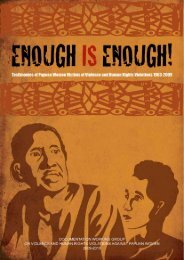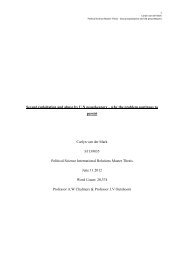The Impact of Armed Conflict on Women and Girls - UNFPA
The Impact of Armed Conflict on Women and Girls - UNFPA
The Impact of Armed Conflict on Women and Girls - UNFPA
Create successful ePaper yourself
Turn your PDF publications into a flip-book with our unique Google optimized e-Paper software.
affected women in Bosnia <strong>and</strong> Croatia. <str<strong>on</strong>g>The</str<strong>on</strong>g> programme provided psychological,<br />
educati<strong>on</strong>al <strong>and</strong> health-care support through a well-established network <str<strong>on</strong>g>of</str<strong>on</strong>g><br />
women’s centres <strong>and</strong> groups, as well as IEC activities, including radio<br />
programmes <strong>and</strong> publicati<strong>on</strong>s. <str<strong>on</strong>g>The</str<strong>on</strong>g> MSI/Stope Nade projects c<strong>on</strong>tinually<br />
exp<strong>and</strong>ed the advocacy <strong>and</strong> advisory comp<strong>on</strong>ent <str<strong>on</strong>g>of</str<strong>on</strong>g> the programme, providing<br />
advice <strong>and</strong> support <strong>on</strong> a wide range <str<strong>on</strong>g>of</str<strong>on</strong>g> refugee-related difficulties <strong>and</strong> social<br />
issues, including violence <strong>and</strong> human <strong>and</strong> legal rights. Local experts in Bosnia<br />
<strong>and</strong> Croatia provided all advice <strong>and</strong> informati<strong>on</strong>, making the informati<strong>on</strong> as<br />
culturally appropriate as possible.<br />
It was also important for the project to link up with legal aid agencies <strong>and</strong><br />
specialist human/legal rights advocacy agencies to ensure the proper<br />
documentati<strong>on</strong> <str<strong>on</strong>g>of</str<strong>on</strong>g> cases as well as a str<strong>on</strong>g support network empowering women<br />
to make informed choices about their lives. Not <strong>on</strong>ly did this comp<strong>on</strong>ent <str<strong>on</strong>g>of</str<strong>on</strong>g> the<br />
programme exp<strong>and</strong> but it also evolved; informati<strong>on</strong> <strong>on</strong> legal <strong>and</strong> human rights<br />
issues increased to meet the changing needs <str<strong>on</strong>g>of</str<strong>on</strong>g> the host <strong>and</strong> returnee<br />
populati<strong>on</strong>s.<br />
Gender, <str<strong>on</strong>g>C<strong>on</strong>flict</str<strong>on</strong>g> <strong>and</strong> Poverty<br />
Poverty is a cause <strong>and</strong> a c<strong>on</strong>sequence <str<strong>on</strong>g>of</str<strong>on</strong>g> c<strong>on</strong>flict. About 1.3 billi<strong>on</strong> people,<br />
nearly a quarter <str<strong>on</strong>g>of</str<strong>on</strong>g> the world's populati<strong>on</strong>, live in extreme poverty, surviving <strong>on</strong><br />
less than $US 1 a day. Of these, 70 per cent are women. <str<strong>on</strong>g>The</str<strong>on</strong>g>y lack, am<strong>on</strong>g other<br />
things, educati<strong>on</strong> <strong>and</strong> health provisi<strong>on</strong>. Men have more freedom to seek<br />
employment <strong>and</strong> escape poverty. <strong>Women</strong> are frequently left behind to look after<br />
the children, <strong>and</strong> they remain in the poverty cycle. <str<strong>on</strong>g>The</str<strong>on</strong>g> “feminizati<strong>on</strong>” <str<strong>on</strong>g>of</str<strong>on</strong>g> poverty<br />
has aggravated social, gender <strong>and</strong> ec<strong>on</strong>omic imbalances in the developing<br />
world. <strong>Women</strong> also bear the brunt <str<strong>on</strong>g>of</str<strong>on</strong>g> ill-health.<br />
<str<strong>on</strong>g>The</str<strong>on</strong>g> links between poverty alleviati<strong>on</strong> <strong>and</strong> reproductive rights are now well<br />
established. If women have access to reproductive health informati<strong>on</strong> <strong>and</strong><br />
services, they can:<br />
• Take c<strong>on</strong>trol <str<strong>on</strong>g>of</str<strong>on</strong>g> their fertility <strong>and</strong> break the cycle <str<strong>on</strong>g>of</str<strong>on</strong>g> repeated pregnancies,<br />
enabling them to seek employment or training <strong>and</strong> increase family income;<br />
• Improve their own health <strong>and</strong> the survival rates <str<strong>on</strong>g>of</str<strong>on</strong>g> their children; <strong>and</strong><br />
• Protect themselves against STIs, including HIV/AIDS, <strong>and</strong> work towards<br />
empowerment <strong>and</strong> gender equality.<br />
As ec<strong>on</strong>omic situati<strong>on</strong>s worsen, it is imperative that reproductive health<br />
services remain available <strong>and</strong> accessible to all women. Services should be free<br />
or provided at subsidized rates if the health <str<strong>on</strong>g>of</str<strong>on</strong>g> refugee communities is not to<br />
decline further.<br />
44




![IANSA [PDF, 2MB] - PeaceWomen](https://img.yumpu.com/25206379/1/190x123/iansa-pdf-2mb-peacewomen.jpg?quality=85)
![Commitments Sample [PDF, 93KB] - PeaceWomen](https://img.yumpu.com/25206331/1/190x245/commitments-sample-pdf-93kb-peacewomen.jpg?quality=85)










![A Toolkit for Advocacy and Action [PDF, 260KB] - Peace Women](https://img.yumpu.com/25205989/1/190x245/a-toolkit-for-advocacy-and-action-pdf-260kb-peace-women.jpg?quality=85)